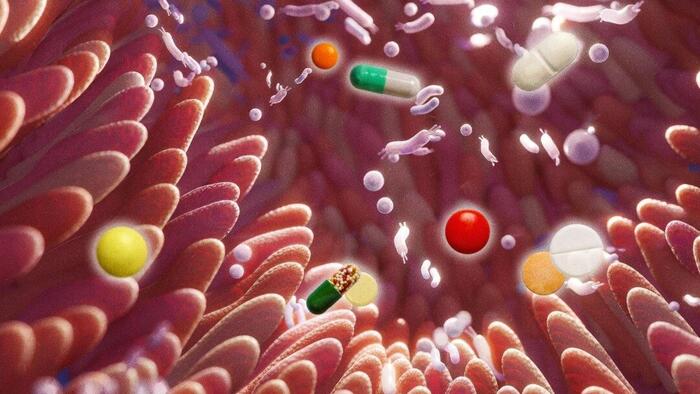In a revealing study published by The Epoch Times, researchers found that many medications have a lasting impact on gut health, persisting for years after treatment concludes. Although the body typically metabolizes drugs within hours or weeks, this new evidence suggests that the effects of commonly prescribed medications can linger long after they are stopped. Notably, nearly 90% of these medications result in permanent alterations to gut bacteria, extending beyond the known effects of antibiotics to include drugs for high blood pressure, anxiety, and digestive issues.
Kara Siedman, a nutritionist and director of partnerships at Resbiotic Nutrition, commented on the findings, highlighting that “we may be underestimating the impact of common medications on gut health.”
Medications and Gut Microbiome Changes
The comprehensive study indicates that various drugs, including antidepressants, beta-blockers, and proton pump inhibitors, can significantly reshape gut microbial compositions. For instance, medications that are aimed at human cells, like those mentioned, are now recognized for their interaction with the gut ecosystem, which comprises microbes, the intestinal barrier, and the immune system.
The research tracked a smaller group of participants over time to confirm the causal relationship between medication and gut health. It revealed that while taking certain drugs resulted in noticeable gut changes, discontinuing them often reversed these shifts, affirming this link.
The study’s findings illustrate how benzodiazepines, frequently prescribed for anxiety, can lead to reductions in microbial diversity comparable to certain broad-spectrum antibiotics. Likewise, patterns of gut changes were seen with antidepressants.
Specific Bacterial Types Impacted
Those taking medications like antidepressants and beta-blockers were found to have increased levels of the Clostridium family of bacteria, which has associations with various human infections. Benzodiazepines, on the other hand, influenced the growth of Dorea formicigenerans and Ruminococcus torques. While Dorea can produce beneficial metabolites, it is also linked to obesity and metabolic syndromes. Ruminococcus torques is known for breaking down mucus in the gut lining, often associated with gastrointestinal conditions when found in high quantities.
Interestingly, different benzodiazepines showed varying effects on gut microbial diversity, with alprazolam (Xanax) causing greater reductions than diazepam (Valium).
Further complicating the issue, proton pump inhibitors led to increased oral bacteria levels that are linked to periodontal disease and cavities.
The Cumulative Impact of Past Medication Use
One alarming aspect of the findings is the cumulative effect of using certain drugs. Patients with a history of antibiotic use did not recover their gut diversity as those who had never taken such medications, irrespective of how long ago they had completed their therapy. The data indicated that higher doses and prolonged durations of use resulted in stronger and more long-lasting changes within the microbiome. This pattern extended to other treatment classes, including steroids and beta-blockers.
Mechanisms of Gut Alteration
Medications can influence the gut microbiome through several mechanisms, including:
1. Growth Regulation: Some drugs impede the growth of specific bacteria while allowing others to flourish, resulting in an imbalanced microbiome.
2. Direct Microbial Impact: Certain drugs can kill or suppress beneficial microbes directly.
3. Stomach Acid Alteration: Medications may affect stomach acid levels, altering which bacteria can thrive.
4. Immune Response Modification: Changes in how the immune system operates can also impact gut health.
5. Gut Barrier Integrity: Some medications contribute to increased gut permeability, leading to inflammation and shifting which microbes can survive.
In particular, beneficial gut microbes play critical roles by producing short-chain fatty acids that help maintain a healthy gut. The loss of these microbes can contribute to increased inflammation and a compromised gut barrier, which may lead to metabolic issues, including fatty liver and insulin resistance.
While some microbial populations can rebound after medication cessation, complete recovery is not guaranteed. A recent review pointed out that, even if diversity returns, the bacterial composition might remain altered for months.
Vulnerability in Early Life
Infants are especially susceptible to changes in gut microbiota. A notable 2022 study revealed that babies who received proton pump inhibitors for over 400 days displayed less diversity in their gut microbiome, with these alterations lasting even one month post-medication. Early exposure to antibiotics is also linked to a greater risk of developing metabolic and allergic disorders later in life.
Variability in Recovery
The impact of medications on gut health is not uniform; individual responses can differ widely. Diet plays a essential role in supporting gut microbial diversity. Siedman explains that a high-fiber diet helps restore balance post-antibiotic treatment, whereas low-fiber diets may weaken the gut lining, hindering recovery processes.
Additionally, two people on the same medication may experience vastly different microbiome changes based on their baseline gut health.
Recommendations for Gut Protection
For those who must continue taking medications, Siedman recommends various strategies to support gut health:
– Focus on Fiber Diversity: Incorporate a wide range of whole grains, legumes, fruits, and vegetables.
– Include Polyphenol-Rich Foods: Berries, green tea, and cocoa can nourish beneficial bacteria while reducing inflammation.
– Add Fermented Foods: Consuming yogurt, kefir, sauerkraut, and kimchi can introduce live microbes and enhance gut health.
– Consider Targeted Supplements: Certain probiotics, prebiotics, and postbiotics can help maintain microbial balance and support intestinal integrity.
As research continues to unfold, the implications for gut health following medication use emphasize the importance of informed choices in both treatment and nutrition.






